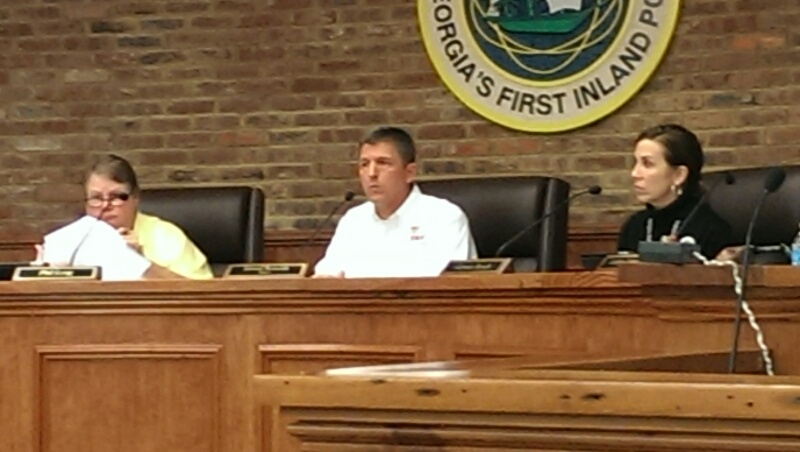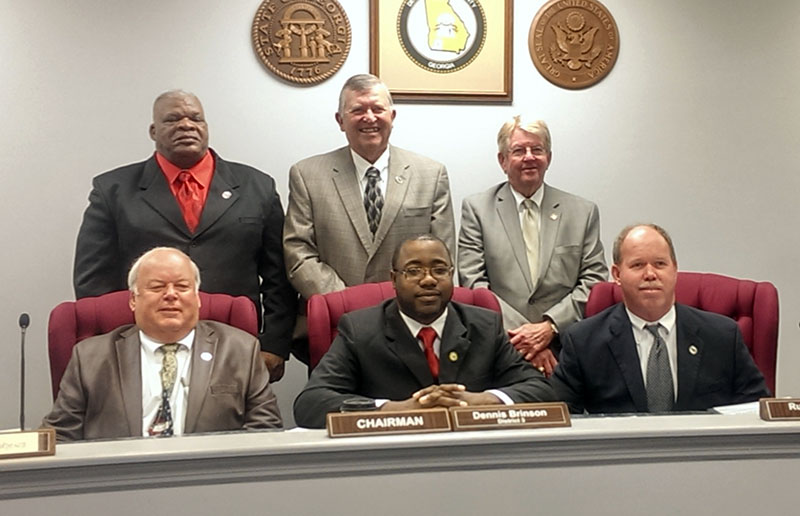

Just a couple of days after the Bainbridge City Council approved possible legal action to resolve a disagreement with Decatur County government, Bainbridge Mayor Edward Reynolds said on the radio that some progress is being made toward negotiating the issues without a third party getting involved.
Appearing as a guest on the Jesus and Jammin’ morning show on Thursday morning, Mayor Reynolds said his optimism is based on the promise of three new county commissioners who will take their seats in January 2015. Reynolds said tentative “small group meetings” involving members of the Bainbridge City Council and Decatur County commissioners have been scheduled for the week of Nov. 10.
The council approved a resolution which starts a path toward court-mediated negotiations by a vote of 5-1; Council members Luther Conyers, Joe Sweet, Phil Long, Don Whaley and Glennie Bench voted yes to the resolution, while Councilwoman Roslyn Palmer voted no.
The City Council also held a Town Hall meeting to explain the city’s stance on service delivery agreements and allow citizens a chance to ask questions.
Click to download the Mayor’s Service Delivery Town Hall Meeting presentation (1.1 MB, PDF)
The Georgia Service Delivery Act was adopted as state law in 1997. The law states “the process … is intended to minimize ineffecients resulting from duplication of services and competition between local governments and to provide a mechanism to resolve disputes over local government service delivery, funding equity and land use.”
During a presentation at the start of Tuesday’s meeting, Mayor Reynolds said there are 32 local government services listed in the service delivery strategy legislation. Of those 32 areas, only nine results in inequity for city residents, according to City of Bainbridge leaders. Those nine areas that the City Council wants to discuss with County commissioners are:
- Animal control
- Code enforcement, land use, inspections, Planning and Zoning
- Correctional institution (County Farm)
- Landfill
- Fire protection
- Parks and recreation
- Police services
- Public Utilities
- Road / bridge maintenance and construction

All of those areas are services that Bainbridge citizens are paying taxes to the Decatur County Board of Commissioners for, but do not receive services in return for those dollars, Mayor Reynolds said. In addition, city leaders also take issue with the county asking the city to pay higher rates than other customers at the county’s landfill. The City of Bainbridge currently is sending its garbage to a landfill in Campbellton, Fla., and sends most of its inmates to the Pelham City Jail in Mitchell County, instead of the Decatur County Jail.
Mayor Reynolds said on the radio Thursday that the City of Bainbridge wouldn’t have to go looking for lower rates if county commissioners gave them some consideration for city-provided services that residents in unincorporated Decatur County enjoy. The city also believes that Decatur County commissioners should contribute to the city’s recreation program. In 2014, Bainbridge Leisure Services had 1,187 participants in city recreation programs. 611 of those live outside Bainbridge city limits, according to city figures.
Reynolds said the City of Bainbridge has requested meetings to discuss service delivery strategies on three occasions. To date, county officials have not indicated they are ready to meet, however the county has formed its own committee to research and discuss service delivery issues.
City Council approves possible legal actions
The resolution does several things:
- Appoints and authorizes special counsel to represent the City of Bainbridge in negotiations and legal actions taken to obtain service delivery agreements with Decatur County and other cities of Decatur County
- Appoints and authorizes a committee to supervise and manage settlement negotiations with the county and the legal actions taken in the case
- Authorizes the employment of expert witnesses to assist in the preparation and presentation of the city’s case
The City of Bainbridge had already hired twoattorneys to represent the city; they include local attorney David Kendrick, who had represented the city previously during negotiations for how to allocate the proceeds of local option sales taxes, Attorney Buddy Welch of McDonough, Ga. A third attorney, J. Michael Brown, helped Welch conduct research starting in Fall 2013.
The city’s Service Delivery Strategy Committee will consist of Mayor Reynolds, David Kendrick, Buddy Welch, City Manager Chris Hobby and Michael Brown. The resolution also authorizes Hobby to pay all legal fees, expert witnesses’ fees and other costs of litigation as bills are presented. However, the resolution leaves the future settlement of all proposed service delivery strategy agreements to a vote by the Mayor and City Council.
Could talks between local leaders ward off court mediation?

Mayor Reynolds and Councilwoman Glennie Bench have been outspoken about the service delivery agreements, while Commissioner-elect Pete Stephens addressed the City Council on Tuesday night and said he was willing to “sit down at the table” with the city’s elected officials.
County Commissioner-elect Pete Stephens addressed the City Council and said he was “ashamed of where we are right now.”
“There’s two sides to every story, and I would like to postpone the meetings until at least January,” Stephens said. “We can’t answer two years’ worth of questions in two months. We have a committee meeting weekly to discus what we can do to solve the issue.”
Stephens insisted that no lawyers should be allowed to sit in on the negotiations between the two groups of elected officials. In Stephens view, that would preclude the involvement of both the City of Bainbridge’s legal counsel as well as County Attorney Brown Moseley.
Stephens said his opinion was not based on the personality of the lawyers, but rather that he felt elected officials would be motivated more strongly to agree with eachother without lawyers present. Mayor Reynolds said Thursday that in city leaders’ view, the attorneys it has retained on the matter of service delivery are thought of “more as consultants”, rather than lawyers, because of the complexity of the two local governments’ budgets and the service delivery process outlined by the State of Georgia.





Be the first to comment